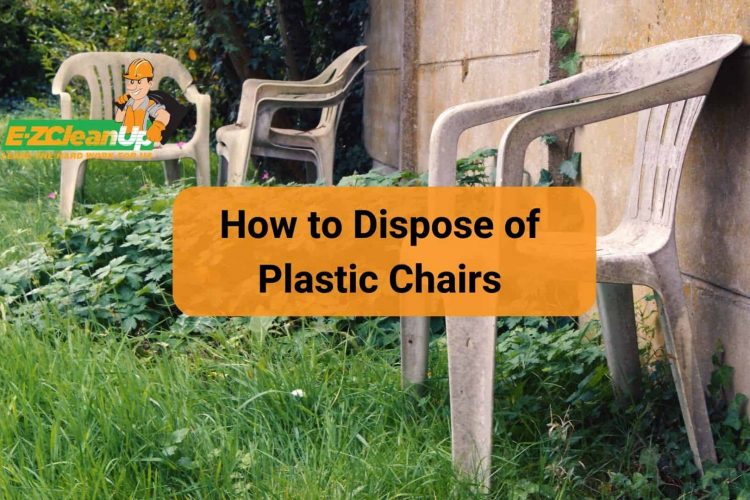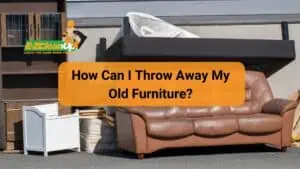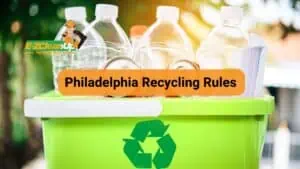To dispose of plastic chairs, find a local recycling facility that accepts the type of plastic your chairs are made from, such as polypropylene or high-density polyethylene. Ensure the chairs are clean and free of contaminants before recycling.
Explore the full range of options on how to dispose of plastic chairs in our detailed guide.
Options for Disposing of Plastic Chairs
You don’t need to dispose of old or damaged chairs at once. You can try the following repurposing and creative ideas to turn them into something useful:
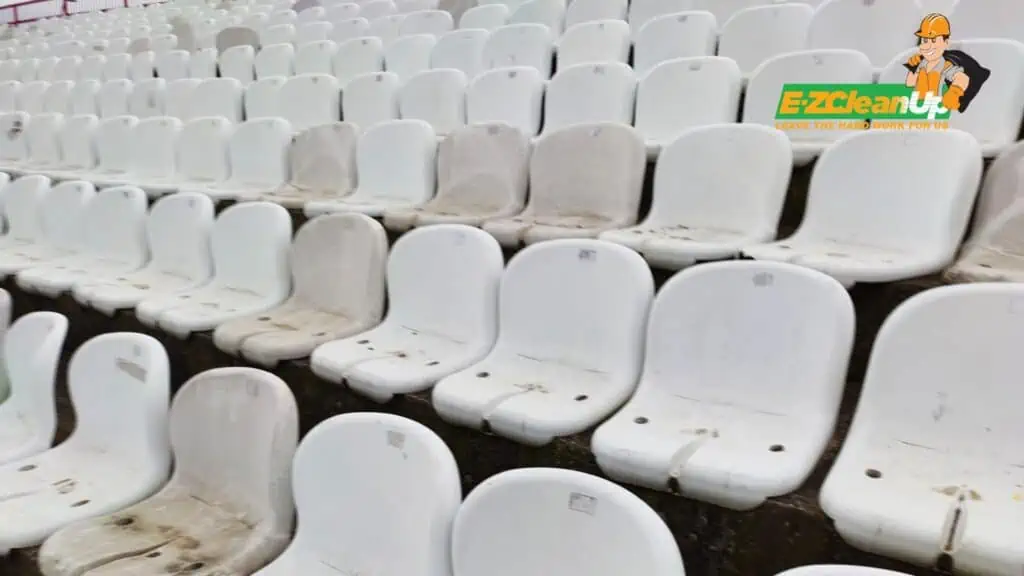
Repurposing Old Plastic Chairs
When it comes to repurposing old plastic chairs, there’s a world of possibilities beyond just discarding them. Here are some innovative and practical ideas:
- Outdoor Seating: Transform a chair into stylish outdoor seating. With some paint and perhaps a new cushion, you can create a comfortable and attractive piece for your patio or garden.
- Storage Box: Use the legs and seat of the chair, add a cushioned top and a liner, and you have a perfect storage solution for various items like toys, sewing materials, or bathroom essentials.
- Dog Feeders: For pet owners, converting chairs into dog feeders is a charming idea, especially for taller dogs. This involves cutting a section in the seat for stainless steel bowls.
- Hall Tree: Create a hall tree by disassembling the chair a bit. Add a cushion to the seat and hooks to the back for a functional and decorative item.
- Sidewalk Chalkboard: A broken chair can be turned into a sidewalk chalkboard, ideal for businesses, weddings, or parties.
- Coat Rack: Use the back of the chair to make a DIY coat rack. This can be stained, painted, or sanded for a distressed look.
- Bathroom Shelf and Hanger: Entire chairs can be used to create a bathroom shelf and hanger, which can provide you with a unique storage solution.
- Shoe Storage: An inventive way to store shoes is by using an old chair, especially if you have limited space.
- Rustic Garden Shelf: Turn a broken chair into a garden shelf, a great way to display plants or hold garden necessities.
- Drink Stand: Ideal for outdoor gatherings, a drink stand can be made by cutting a circle into a chair seat and adding a rustic bucket.
- Planter Box: Convert a chair into a planter box for flowers or herbs. This can add charm to your stoop or garden.
- Towel Rack: Chair backs can be repurposed into towel racks for a bathroom.
- Pet Beds: By adding padding to a chair seat or back, you can create a cozy bed for your furry friend.
Donating to Charities or Community Centers
Donating old plastic chairs to charities or community centers is a practical way to extend their lives and serve a social cause. Charities often accept furniture donations, including plastic chairs, to support various community initiatives like local events, schools, or shelters.
Community centers can repurpose these chairs for public events, meetings, or recreational activities, making them valuable assets. This form of donation prevents chairs from ending up in landfills while supporting community projects and those in need.
Before donating, it’s essential to ensure that the chairs are in good condition. Broken or severely damaged chairs might not be acceptable. Research local charities and community centers to find out their specific needs and donation guidelines. Some organizations may offer pick-up services, making it easier to donate large quantities.
Remember, donating chairs can be a form of tax deduction, so keep a record of your donation for tax purposes.
Recycling Plastic Chairs
Plastic chairs, often seen in gardens, offices, and public spaces, pose a significant challenge when it comes to disposal. They’re bulky and made of materials that don’t easily break down. However, recycling them is a smart move, both for the environment and for decluttering purposes.
Finding Local Recycling Facilities
First things first, you need to find a place that’ll take your old plastic chairs. Not all recycling facilities can handle bulky plastic items like chairs. It’s essential to call ahead or check online to see if they accept the type of plastic your chairs are made of.
Remember, recycling rules can vary greatly from one area to another. In the US, for example, municipal recycling programs and waste management services often provide specific guidelines on their websites about what they can and can’t accept.
Understanding the Recycling Process for Plastic Chairs
Knowing how your chairs will be recycled helps in understanding the importance of this process. Here’s a simplified rundown:
- Collection and Transportation: Your chairs are collected and taken to a recycling facility.
- Sorting: Chairs are sorted based on their plastic type. Most plastic chairs are made of polypropylene or high-density polyethylene, both of which are recyclable.
- Cleaning: The chairs are cleaned to remove any contaminants.
- Shredding and Melting: The clean plastic is then shredded into small pieces and melted down.
- Repurposing: This melted plastic is molded into new products, ranging from outdoor furniture to storage containers.
Understanding Plastic Chair Disposal
When it comes to disposing of plastic chairs, the key is to understand the materials they are made from and how these materials can be recycled. Here’s a breakdown of the process:
Identifying Types of Plastic in Chairs
Plastic chairs are typically made from several types of plastic, each with unique properties and recyclability. The most common types include:
- Polypropylene (PP): It is known for its stiffness, strength, and chemical resistance. It’s a popular choice for chairs due to its lightweight and ability to withstand extreme temperatures. PP chairs are recyclable.
- Polyethylene (PE): This type is known for its durability and flexibility. PE is often used in outdoor furniture like garden chairs and is also recyclable.
- Acrylonitrile Butadiene Styrene (ABS): Noted for its strength and impact resistance, ABS is commonly used in the bases and structural components of chairs.
- Polycarbonate (PC): Recognized for its high impact resistance and clarity, PC is strong and often used in areas where visibility is important, like in certain office chairs.
- Polyvinyl Chloride (PVC): PVC is flexible and durable and is used in various chair types due to its chemical resistance.
- Nylon: Known for its strength and durability, nylon is often used in more industrial chair applications.
Each of these plastics has specific recycling requirements and potential.
Recognizing Recyclable vs. Non-Recyclable Plastic Chairs
Not all plastics are equally recyclable. For example, High-Density Polyethylene (HDPE) and Polyethylene Terephthalate (PET) are highly recyclable and commonly used in outdoor furniture and certain components of chairs. However, plastics like Polystyrene (PS) may be less recyclable due to economic and facility constraints.
Typical Recycling Identification Code (RIC) Symbols
Most plastic items, including chairs, carry a Recycling Identification Code (RIC), which is a number enclosed within the recycling symbol. This number indicates the type of plastic. For instance, #1 is PET, commonly found in bottles, while #2 is HDPE, used in heavier-duty items like outdoor furniture. Knowing these codes helps in sorting and recycling the plastic correctly.
Benefits of Proper Disposal and Recycling
Disposing of plastic chairs properly and recycling them offers several benefits that are crucial for both our environment and society.
Reducing Environmental Impact
When plastic chairs are not recycled, they often end up in landfills or as litter, taking hundreds of years to decompose. This contributes significantly to environmental pollution, including pollution in our oceans.
By 2050, it’s estimated that there could be more plastic than fish in the oceans by weight. Recycling plastic chairs reduces this environmental burden significantly by keeping them out of landfills and waterways.
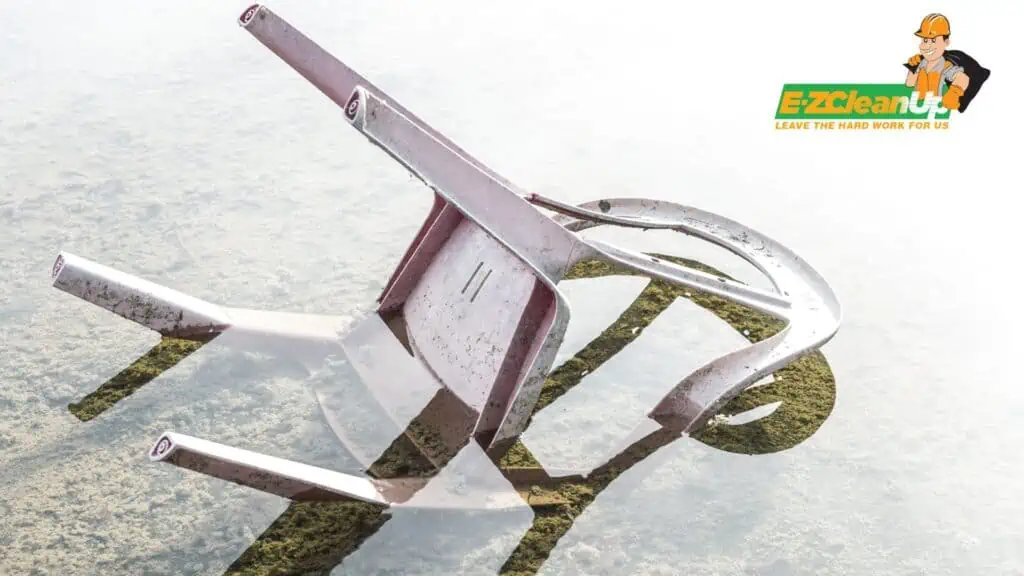
Conserving Resources and Energy
Recycling plastic chairs helps conserve resources and energy. For instance, the production of new plastics requires significant amounts of petroleum, a non-renewable resource.
By recycling, we reduce the need for new raw materials and save energy compared to manufacturing new products from scratch. The process of recycling uses less energy compared to producing new plastic from oil or gas, which ultimately reduces our carbon footprint.
Contributing to Job Creation in the Recycling Sector
The recycling industry is a significant contributor to job creation. By participating in the recycling of plastic chairs and other materials, we support an industry that benefits the environment while providing employment opportunities. The growth of recycling facilities and programs can lead to more jobs in the collection, processing, and remanufacturing of recycled materials.
Common Challenges in Plastic Chair Recycling
Recycling plastic chairs involves several challenges that need to be addressed for effective and sustainable management.
Addressing the Lack of Infrastructure
One major challenge in recycling plastic furniture, including chairs, is their complexity due to their diverse composition. Different types of plastics are used in manufacturing these chairs, like polyethylene (PE) and polypropylene (PP), each requiring different recycling processes. This variety makes sorting and processing a demanding task for recycling facilities.
Additionally, the existing recycling technologies, primarily designed for single-type plastic items, face limitations when it comes to the diverse compositions found in plastic furniture.
Overcoming Contamination Issues
Contamination is another significant challenge. Additives, dyes, and reinforcing materials used in plastic chairs often hinder the recycling process by altering the structural integrity of the plastic. These additives complicate the process of breaking down plastic components efficiently during recycling, affecting the quality and usability of recycled material.
Tackling Low Market Demand for Recycled Plastics
Economic factors also play a crucial role. The process of recycling plastic chairs is often more expensive than producing new ones, which affects the market demand for recycled plastic products. Creating a solid market demand for recycled plastic furniture is essential for encouraging manufacturers to invest in recycling technologies and processes.
Enhancing Consumer Awareness and Participation
Lastly, consumer awareness and participation are vital. Many consumers are not fully aware of the importance of recycling plastic furniture or how to participate in such programs effectively.
Increasing knowledge about the types of plastics and their recyclability, along with promoting design for recycling, could significantly improve the recycling rate of plastic chairs. Collaboration throughout the product chain, including manufacturers, consumers, and recyclers, is necessary to make meaningful progress in plastic furniture recycling.
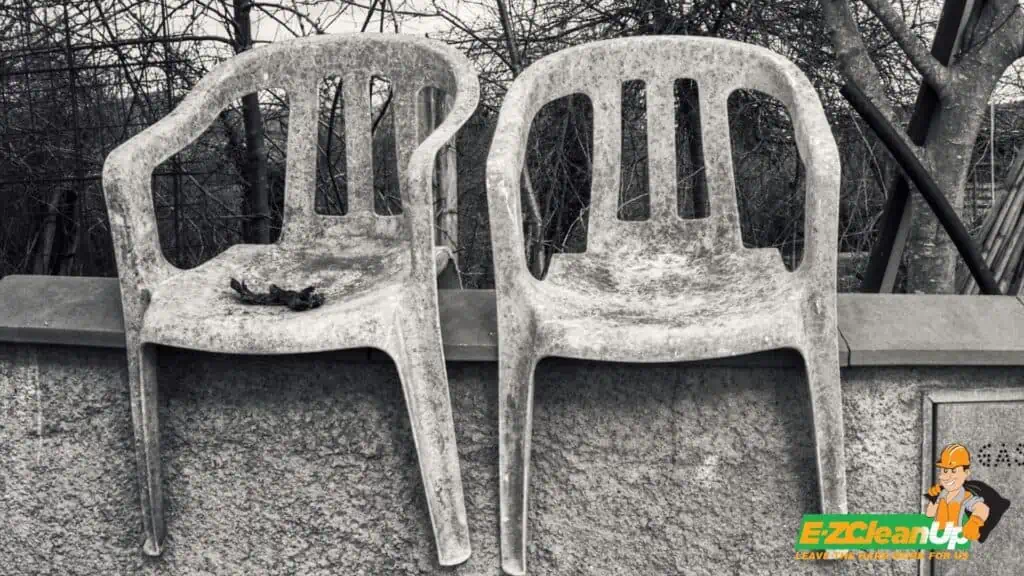
Consider Eco-Friendly Disposal for Your Old Plastic Chairs
Throwing out a plastic chair? Think again! There’s more to disposing of it than just getting rid of an unwanted item. It’s about taking a step towards a greener planet. Recycling plastic chairs conserves resources while keeping our oceans and landfills less cluttered. So, before you throw away that old chair, consider its environmental footprint and make an eco-friendly choice.
And remember, if you’re tackling a bigger clean-up and need a hand, EZ CleanUp is just a call away for all your junk removal needs in Philadelphia. We’re here to help you declutter responsibly!

